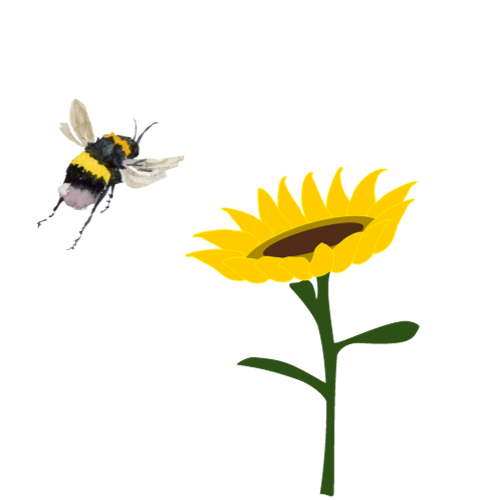
Biodiversity can be broadly defined as the variety of life on Earth. It can also be used as a measure of the variety of life found in one place.
56% of our species in the UK have declined over the past 50 years. Road and other developments, insensitive land management, and lack of funding have created barriers between natural spaces, leading to less room for wildlife.
Wildlife needs our help.
What are we doing to help?

The greatest pollinators
Bees are part of the biodiversity on which we all depend for our survival.
They provide high-quality food—honey, royal jelly and pollen — and other products such as beeswax, propolis and honey bee venom.
When animals and insects pick up the pollen of flowers and spread it, they allow plants, including many food crops, to reproduce. Birds, rodents, monkeys and even people pollinate, but the most common pollinators are insects, and among them, bees.
We don’t have a large garden, so we’ve teamed up with our friends Marc & Nici over at Hollow Oak to sponsor a bee hive at their farm in East Devon. Marc & Nici will be looking after our bee hive for us, making sure the bees get through the winter healthy and can carry on pollinating flowers for generations of bees to come.
We look forward to providing with lots of bee-related updates from our hive over the next year or so. You can help too, by supporting other hives that Marc & Nici look after, head over to their website to find out more!
This is the first of hopefully many projects we’ll be doing to do our bit for nature.
In partnership with

We’ve also been sponsoring West Kirby in Bloom for a few years now to help our bee friends; you can see our planter on Banks Road in West Kirby!

What can you do?
Here are some actions you can take to help preserve bees and other pollinators:
- Plant nectar-bearing flowers such as marigolds or sunflowers for decorative purposes on balconies, terraces, and gardens
- Buy honey and other hive products from your nearest local beekeeper
- Raise awareness among children and adolescents on the importance of bees and express your support for beekeepers
- Set up a pollinator farm on your balcony, terrace, or garden
- Preserve old meadows, which feature a more diverse array of flowers, and sow nectar-bearing plants
- Cut grass on meadows only after the nectar-bearing plants have finished blooming
- Use pesticides that do not harm bees, and spray them in windless weather, either early in the morning or late at night, when bees withdraw from blossoms

